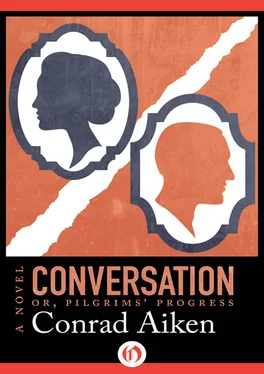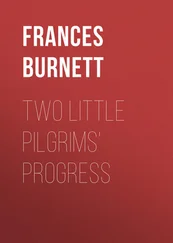“I can’t help it, my pet, she says she’s grateful !”
“ Who’s grateful! Now put me down !”
“Mother Nature, that’s who. Did you ever have a pine tree tell you she was grateful? Did you? No, I’ll bet you didn’t.”
“Don’t be silly ! And you’re scratching me, too. You didn’t shave!”
“I did too shave, you wretch — you and your houses!”
“You’ve spoiled it, see? All those trees knocked down, and the house. Now you’ll have to help me fix it up again!”
“You give me one kiss, and I’ll help you fix it up again.”
“There. Now put me down. You ought to know better !”
“All right. We’ll fix your palace up, my pet, and surround it with a grove of cedar of Lebanon and shittim wood, and put the Queen of Sheba in it, and King Solomon, too, and a lot of angels and archangels and cherubim and seraphim, and we’ll have a procession of kings for them, and music of dulcimers and cymbals and shawms and — sub-tone clarinets. And then, when we’ve done all that, what do you think — before the rain comes, which might be any minute now, we’ll go skulking like Indians by the secret trail down through the primeval forests to the river, and then we’ll prowl all the way home along the shore, keeping invisible, with our tomahawks in our hands.”
“Where are our tomahawks?”
“Here, this is a likely looking tomahawk, and here’s another.”
“And nobody will see us?”
“Shhhh, we mustn’t talk, you know. We must be stealthy !”
“Shhh! Are we ready?”
“Not a sound now — and be careful not to step on twigs! I’ll go first, to blaze the trail, and you follow. Come on!”
From the wet sand bluffs by the river, when they emerged into the wide peace of fog, they could just make out the pale yellow sand bluffs of the golf links, opposite, and a solitary figure stooping to pick up a ball on the ninth green, solemnly replacing the metal flag in the hole. They slid down the slope of sand, filling their shoes; sat for a moment on the matted eel-grass, sea-smelling — the curled stiff wave of eel grass which everywhere lined the shores of the river — to empty out the sand; then resumed their prowl over alternate stretches of beach and tangle. The tide was out, the water waveless, leaden, fog-stilled; through the fog, in the direction of Paul’s lagoon, came the chug-chug of an invisible motorboat, and the cawing of crows. Bayberry and beach plum, mussel shells, clam shells — carapaces of horseshoe crabs, the little ones golden, the larger ones almost black — their footsteps crunched and snapped and crackled amongst these. They were in the wilderness — tomahawk in hand they were revisiting the Indian wilderness, the wilderness unchanged since the beginning of time. Unchanged? Unchanged save by a dream, perhaps — the dream threading the thickets, the fog, the beds of bubbling eel grass, the hushed and overcast noon, exactly as his own world, all morning, had been threaded and changed by the indiscreet dream about Nora. But now, subtly, that had altered again — it was as if, now, through the fog, a single beam of soft light had plunged downward to that obscure shape of shifting and involved struggle, had quickly lighted and lightened the sinister intricacies of the unknown, lighted the lifted hand, brightened the dark face before it turned away — so that suddenly the delicious embrace, the air-borne embrace, had shed all its burden of sorrow and pathos, all pang and pain, and become wholly benign. The secret was suddenly sunlit, the Rubenslike sensuality was sunlit, and the face, which was half Nora’s and half Enid’s, no longer reproached him in desolation as it turned away, but instead — or so it seemed — looked up at him almost merrily before it vanished. Had the dream changed? But how could a dream change afterwards? He must simply have been mistaken about it, not at the time seen it quite clearly — just as he had not known after all that the ecstatic and anguished face was as much Enid’s as Nora’s. Had Nora’s letter done this? I think I know how it is with you, I think you will know how it is with me .
From the indiscreet dream about Nora — strangely, obscurely, like the rayed light from a slowly opening door or window — or like a flood, too — or even, in another sense, like the blood pouring from a freshly reopened wound, releasing and thus ending the pent pain — the sense of the past came thickly and richly, the faces, the words, the mornings, the evenings. But not Nora, or Nora only briefly, for it was as if that first meeting in Washington Street — when he hadn’t even taken off his hat — had itself become the door, which, once opened, readmitted a world which had been obscured or lost. It was Enid, it was the first two years at the Frazer School of Fine and Applied Arts, the first two years in Boston, with Christmas holidays in New Bedford, the snow on the terraced lawns of County Street, the Chicken Hops, the sleigh rides to Buttonwood Park: and it was the motor-paced bicycle races — the first expeditions to the art galleries of New York, the steamer along the freezing Sound — the shabby unheated gas-smelling little hall bedroom of the West Eighth Street rooming house, where he had first met Karl Roth and Kitty, and plunged at once into the new and exciting world of Greenwich Village, with its cafés, its drinking parties, its freak poets and painters — male, female, and neuter — but above all its sense of adventure and freedom. Yes, that, and the sharp sense of reality which it had brought him for the first time, painting as a reality, with a real function in society, and life too as a reality, in a far richer and fiercer sense than anything in his childhood in New Bedford had prepared him for; but along with all these things, behind and beneath them, and lending a fresh vividness and iridescence even to the powerful ambition which they had suddenly quickened in him, was Enid. Iridescence — yes, exactly that; she had brought instantly an astonishing iridescence into everything that surrounded him. It had seemed far away, until Nora had somehow sprung it all back into focus again — but now his first meeting with Enid Severance, at Cousin Anna’s dinner party, and the drive to the dance in the snow, seemed actually more recent than his first meeting with Nora. Adolescent? No doubt. But there had never been such a first meeting before — there could never be such a first meeting again. White magic, all of it — the silver tissue of the shawl drawn by the lifted hands over the young shoulders, and the clear green eyes, young and candid, looking into his own, across the glittering table, between the candles, with a disturbed bewilderment of intensity and question, secret but unconsciously declared, which demanded to be probed even while it suffered and refused — the eyes that could listen, as it were, to nothing else, and turned away only to be turned back again, or after an interval to be found covertly watching — no, there could never be anything like that again, that lovely and naive surrender, which had, at one stroke, drawn him into a completely new world. And then the first “call,” at the absurd and ornate Victorian house, with the fretwork gables, the iron deer standing alert on the lawn in the snow, the wide piazza above the terrace (where later, in the summer, were to be tubs of blue and pink hydrangeas, and the enormous rubber plant) — the first stiff “call,” and meeting Enid’s silent and so obviously disapproving mother, watchful and nervous above her ceaseless knitting, glancing now at himself, now at the black marble clock, which ticked secretly, refinedly, on the mantel. And, after that, the uninterrupted chain of ever more frequent meetings, designed or fortuitous, their eyes everywhere seeking each other out, at every party, in every street, morning or evening, for the delicious renewal and deepening of contact, the exploration of the sense of touch, of which it had seemed so impossible that they could ever have enough. Physical? Metaphysical, rather. Their tangents had been universal, and everywhere — in the vibrations of texture and tone, in the aliveness of light — they had come together very slowly, without other bodily meeting than in the waltz, at a dance, or the gloved hand lightly held at the crowded skating rink, and in that sublimated intoxication, apple blossom and peach blossom, chestnut blossom and the tiger-throated nasturtium, the solemn bells of the Catholic church in the evening, or the far whistles of the tugs in the Bay, had seemed a sufficient bridge, a sufficiently corporeal language — it had been months before they had first kissed. Adolescent, yes — certainly. And perhaps this had been the initial mistake, if anything so profoundly beautiful could ever be a mistake: the poetry had been too pure a poetry, its further implications (of all that the body, and passion, could exact, or time and diurnal intimacy dishevel and destroy) had been too little understood; and when the prose followed, it had inevitably seemed only too ingrainedly prosaic. The realities had come too quickly and harshly, one after another — lack of money, doubts about his career, the interferences and disapproval of Enid’s mother, whose social “ambitions” for Enid had been so cruelly thwarted (good heavens, how she had been shocked at their going to live in a Boston boardinghouse!) — and then, later, the wholly unknown Enid who had cried out quickly with pain, in pneumonia, her eyes animal and unseeing — Enid pregnant — Enid in childbirth — yes, Paul was right, the shock of that “meaty and butcher-shop reality” had been too much for him, it had changed everything. Changed, or only seemed to change? Had the disenchantment been real, or only theoretical — a self-induced and half imagined thing? Had he been disenchanted (if indeed he had been) merely because he had expected to be, faced with these so many and so different realities, and was disenchantment itself therefore only a romantic fiction, or a fiction of the romantic? And how then had Nora so magically managed to give the whole thing back to him? Ah, perhaps because she had instinctively restored to him his belief in the illusion, his belief in the illusion as the only reality. Or, more simply, taught him that the real world was illusion enough!
Читать дальше












